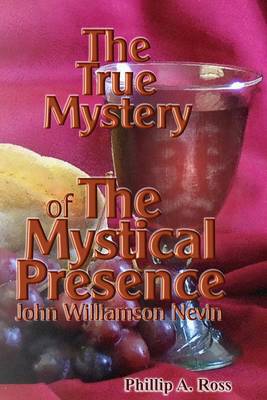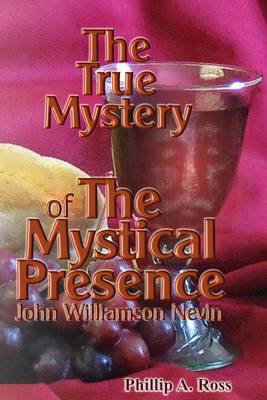
- Retrait gratuit dans votre magasin Club
- 7.000.000 titres dans notre catalogue
- Payer en toute sécurité
- Toujours un magasin près de chez vous
- Retrait gratuit dans votre magasin Club
- 7.000.0000 titres dans notre catalogue
- Payer en toute sécurité
- Toujours un magasin près de chez vous
The True Mystery of The Mystical Presence
John Williamson Nevin, Phillip A Ross
Livre broché | Anglais
31,45 €
+ 62 points
Description
This is a contemporary edition of Nevin's book, The Mystical Presence-A Vindication of the Reformed or Calvinistic Doctrine of the Holy Eucharist (J.B. Lippencort & Co., 1846). It's a sort of dynamic equivalence approach to editing in order to make it more available to contemporary people. I have simply tried to take his work and make it my own, in the sense of comprehending its significance and application. In doing so, I have taken broad license to edit, interpret, clarify and expand what I think Nevin is saying. My efforts will surely annoy Nevin purists, academics and intellectuals who are more concerned with form than content.Why have I approached The Mystical Presence in this way? Because I understand what Nevin said. His book, like no other I have ever read, has brought together various strands of my own life and pursuits in such a way that has astonished me. It is like he is already where I have been trying to go. I have been working over the past forty years to get where he was more than a century and a half ago.Nevin was the American voice of the German Reformed tradition. Having studied under Charles Hodge at Princeton, he accepted a position with the German Reformed Church to lead their only seminary. It is wonderfully curious that German immigrants would put an American in such a position, but that's what they did. Nevin then called Philip Schaff, a Swiss born, German educated, Christian historian to join him in this effort. They then made a huge splash in the American Christian scene, after which Schaff went to Union Seminary to support the cause of liberal Christianity. And Nevin slipped into obscurity and an early retirement. It is often thought that Nevin also fed the liberal Christian stream in America, but that's not what happened. Nevin simply held his ground and the world passed him by.But there has of late been a resurgence of interest in Nevin and the Mercersburg Theology. It seems that Nevin is at the center of what is still a little known controversy that has erupted in the conservative Reformed churches (the Presbyterian Church in America, the Orthodox Presbyterian Church in America, and a few others). Other Christians and denominations will be completely unaware of these issues. That controversy is known as the Federal Vision.1 The Federal Vision is often confused with the "New Perspective on Paul," another current controversy, but the two issues are not the same and must not be conflated. Exactly what the Federal vision is and its impact on Christianity today is yet to be determined. My concerns here are not for or against the Federal Vision, but for Nevin's contribution to American theology.
Spécifications
Parties prenantes
- Auteur(s) :
- Editeur:
Contenu
- Nombre de pages :
- 436
- Langue:
- Anglais
Caractéristiques
- EAN:
- 9780983904601
- Date de parution :
- 21-09-11
- Format:
- Livre broché
- Format numérique:
- Trade paperback (VS)
- Dimensions :
- 152 mm x 229 mm
- Poids :
- 580 g

Les avis
Nous publions uniquement les avis qui respectent les conditions requises. Consultez nos conditions pour les avis.






